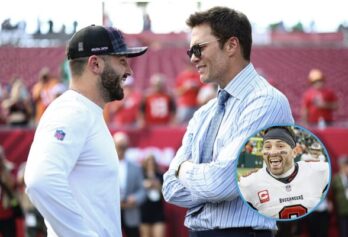It’s the play that has haunted Peyton Manning for over a year.
As time ticked off the clock in the first overtime of Denver’s divisional round matchup against the Baltimore Ravens, Brandon Stokley broke off his route on 2nd and 6 to dive back on a post towards the middle of the field.
Stokley and Manning had a rapport. He was the Colts slot receiver from 2003 to 2006. His only 1,000 yard season occurred during Peyton Manning’s then record-setting 49 touchdown campaign when Stokley reeled in career-highs of 68 catches and 10 touchdowns. But Stokley was now a 36-year-old receiver on his last legs. Spinal fusion surgery had sapped Manning of much of his arm strength, which still forces him to rely on getting the ball out quickly on short and intermediate routes, but he was still an elite signal caller.
Manning saw him as he drifted out of the pocket towards the right sideline away from Stokley, but his ill-advised cross body pass was picked off by cornerback Corey Graham. A few plays later, the Ravens kicked the game-winning field goal en route to the Super Bowl.
The final offensive play of last season compelled Broncos Team President John Elway to address their shortcomings in the slot by seeking out a quicker, more skilled slot receiver. In his view, upgrading the slot receiver position was integral to Manning’s future in Denver.
The timing couldn’t have been more auspicious.
Labeling a wide out as a slot receiver can often be perceived as a pejorative from outsiders and used as a negotiating tactic from the organization to lower a player's contract negotiation standing. It's also a position that Wes Welker has owned for the seven seasons.
The 5-9 receiver is too small and not athletic enough to run routes with too much depth on a regular basis, but his perennial Pro Bowl numbers have set an example for hobbit-sized receivers everywhere. However, contentious contract negotiations between 32-year-old Welker and the Patriots were stalled.
Reportedly, Wes Welker felt so underappreciated by New England that it was reported that if the most he could receive on the free agent market matched the Patriots' offer, he would bounce. According to ESPN Boston, the Patriots' last offer to Welker before free agency was two years for $10 million with incentives that could have increased it to $16 million.
The Pats moved too slowly, undervalued his worth and Welker took his good luck charm to the other side of the eternal Manning-Brady blood feud by inking a two-year $12 million deal in Denver.
One man’s trash is the other Manning’s treasure. Manning was as ecstatic as Tom Brady was enraged. You may have seen some of that residual anger shining through during his weekly violent outburts on the Pats sideline this season.
If there’s any vindication for Welker’s value as a football player, it’s been this season. Don’t be fooled by the underwhelming (by Welker standards) 78 catches for 778 yards in 13 games. Taking into account the Broncos predilection for running out the clock in a slew of lopsided victories and the receiving talent Manning has spread the wealth amongst, Welker hasn’t skipped a beat.
The receiver who was considered a product of the Pats system and unwanted by the rest of the NFL as a college prospect or colleges as a high school tailback has proven to be more of a king than a pawn in Denver by catching as well and becoming a key component in the Broncos quick passing offenses. It’s not a fluke that Brady and Manning have both had their best individual passing seasons in their first seasons throwing to Welker.
For the last 14 years, Welker has been privy to being a vital cog in pro and college football’s most prolific offenses. Manning's 55 touchdowns took back the single season record that Brady deeboed from him six years earlier. The points record the Broncos shattered the next week also originated from Welker's 2007 Patriots.
Long before Art Briles discovered a Texas high school quarterback named Robert Griffin III, a troubled receiver named Josh Gordon or shattered NCAA offensive records, he was starting from the bottom as the Texas Tech running backs coach. His first recruit was a diminutive Welker. In 2000, Briles and rookie head coach Mike Leach offered him the final scholarship available after Lenny Walls committed to Boston College.
Despite scoring 80 touchdowns at running back in Oklahoma City for 2A Heritage Hall, Welker wasn’t built to take the pounding at that position on the FBS level, but playing in the slot was where Leach envisioned him starring.
His quarterback Kliff Kingsbury would leave a slew of career and single season passing records behind in his wake. Until Michael Crabtree strode into Lubbock, Welker was the most prolific receiver to emerge from a program famous for its Air Raid offenses.
On special teams is where Welker stood out though. He graduated as the record-holder for career punt yardage and his punt return touchdowns mark still stands today.
However he went undrafted because wasn’t very fast in the 40. But he was compact, quick, ran great routes, and had a compulsive obsession for creating yards out of thin air and finding first downs.
Welker gained more all-purpose yards in his first three seasons with the Dolphins, than any player in NFL history besides Gale Sayers. Yet, he never recorded a 100 yard receiving game before he signed with the Patriots in 2007.
For six seasons, Welker and Brady developed a telekinetic connection as Welker caught a league-best 112 catches per season during his six seasons in New England. Welker’s arrival coincided with their mercurial Moss’ falling from football firmament into Gillette Stadium. Brady eclipsed Manning’s single-season passing touchdown record and nearly half contributed to Moss’ single-season touchdown record. Welker and Brady are the ones who became the NFL standard. Those aforementioned 112 catches per season calculated out to 672 catches, the most for any player in a six-year span.
Since 2004, Welker has been the King of YAC with 4,403 total yards after catch. Second place, Andre Johnson doesn’t even have 3,000. Unfortunately, he also developed a deserved reputation as a butterfingered receiver.
Of all his catches amd regular season records, one play in the Super Bowl may have overshadowed his lengthy list of accomplishments as a Patriot.
Up 17-15 over New York, with just over four minutes remaining in Super Bowl XLVI, Brady put some air underneath a pass to Welker, who had to leap, not one of his strong suits, developed a case of seal hands and let the pass bounce off his gloves.If he were three inches taller with larger hands, that play would have won the Super Bowl. After bobbling what would probably have been the championship-winning pass, Welker doubled over and dropped his head into his hands.
It’s as if the combined karma of Manning to Tyree and then Manningham borrowed from Welker’s kismet. It’s the play that’s probably stuck in a bad Vine loop in the minds Pats fans, Brady and especially Welker. Fatigue over Welker’s malfunctioning catching mitts may have been one of the primary reasons New England low-balled him in negotiations last spring and replaced him with Texas Tech clone Danny Amendola.
According to ESPN Stats and Info, Welker has caught passes at a rate of 12.5 receptions for every drop (326 catches, 26 drops) since 2010. Amendola’s drop rate (percent of passes dropped) last season was second-lowest in the league at 21.9 receptions per drop.
This season, Welker was third in drops after finishing last season with the second-most in the league. However, Welker’s impact outweighed his negatives.
The greatest measure of Welker’s impact was how the Broncos third down conversion rate faltered while he was resting after suffering his second concussion of the 2013 season.
Welker isn’t having the best statistical season of his career, but he’s made enough of an impact to make New England finally miss him. Demaryius Thomas and Eric Decker are the top wideouts, but Welker is the safety valve. He’s not getting any younger though and a Super Bowl ring has eluded him. Both Welker and his new quarterback have gaudy regular season statistics, but their ability to compartmentalize and perform up to their abilities in high-pressure playoff situations is sus.
Truthfully, history isn't on Denver's side. No player has ever won the Super Bowl after leading the league in passing yardage. It's a stat I first bust out while the Patriots were putting the finishing touches on a 16-0 regular season. They're 0-48 all-time. It's a peculiar stat which points to the falliblity of overreliance on passing on teams that either have unreliable running backs, fall behind often in the second half or get stuck in shootouts because of a porous defense. The Broncos may be the latter.
None of the seven highest-scoring teams in NFL history have won the Super Bowl and only two world champions this decade were No. 1 seeds.
Von Miller's Week 16 ACL tear is compounded by the rotten luck associated with Elvis Dumervil's unintentional free agency and doesn't bode well for the Broncos pass rush in the post season. The Broncos passing attack will have to do some heavy lifting to become world champions.
By earning three more wins, beginning this weekend both Welker and Manning can purge their respective playoff demons.



